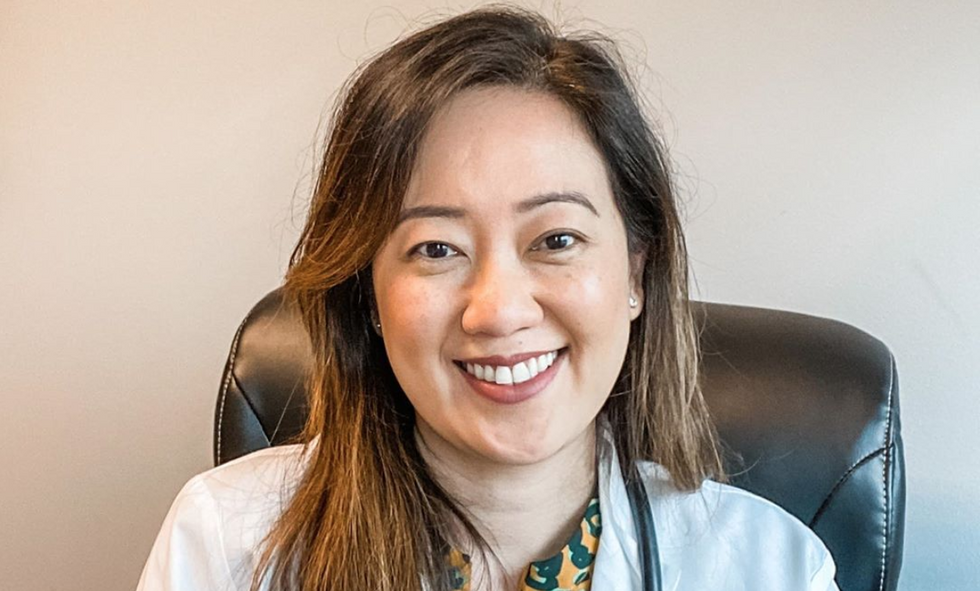Polycystic Ovarian Syndrome (PCOS) is an autoimmune disease that impacts approximately 1 in 10 women. Any woman who has PCOS can attest to the fact that no two cases are the same — there are so many aspects of hormonal health that can impact a woman's reproductive health! For many, PCOS is a trial and error condition, with many doctors' appointments depending on the stage of life the woman is in.
This week I sat down with Dr. Anjanette Tan to get the expert opinion on all my PCOS questions. Dr. Tan is a board-certified endocrinologist who's worked in private practices since 2004. She currently works at the Diabetes and Thyroid Center of Fort Worth, one of the largest all-endocrine practices in the area, where she is the managing partner and head of clinical research.
Before we begin, what's the difference between endocrinology and gynecology? I often find myself mixing the two up when it comes to discussion about PCOS.
Gynecology is all female health and organs. It's an entirely different specialty that people can choose to go to after medical school. Of "OB/GYN," the "ob" refers to pregnancy and childbirth. The "gyn" refers to caring for ovaries, cervical health, and uterine health — everything beyond childbirth that still caters to female organs.
Endocrinology is a different specialty, focusing on internal health within hormones. There are so many hormones that people don't even think about. We take care of adrenal glands, pituitary glands, gonads (meaning ovaries for females, testicles for men), thyroid, parathyroid (calcium hormone and bone health). Endocrinologists are the medical doctors who take care of hormone conditions.
So within that, PCOS is a hormone imbalance. Talk us through your experience with PCOS and how you see that in your patients.
Women are in a good spot when they are referred to me. They start to see a doctor when they start skipping periods, so they generally go to the gynecologist first. The gynecologist may then check your hormone levels, do a scan of your uterus, and do an ultrasound to check some things out. If they don't see any immediate issues, that's when they'll send the woman to me.
There are three general criteria for a woman with PCOS. The first is irregular periods. The second is ultrasound evidence that there are multiple cysts on the ovaries. The third is hirsutism, which means unwanted, excessive hair growth. There are other conditions that can cause you to show these symptoms — these symptoms don't automatically mean PCOS. That's why women come to me, to make sure we know exactly what's going on hormonally.
To be diagnosed with PCOS, you only need two out of three of these symptoms. That's why I hate the name "polycystic ovarian syndrome" — you technically don't need ovarian cysts to have it.
PCOS comes with a lot of baggage. You tend to gain weight, you may be insulin resistance, infertility is a problem, and there may be thyroid issues (that assist in weight gain). There are a lot of moving parts, so it's crucial for us to check all the boxes when a woman first comes in.
You mentioned a connection with diabetes and thyroid health — what's the connection between those two and PCOS? How do you treat all three holistically?
When I see women with PCOS, I generally see insulin resistance. That issue (insulin resistance) is a whole Pandora's box. Insulin is the hormone that makes the sugar go from outside the cell to inside the cell — to make energy. Every cell needs insulin to work. if you're insulin resistant, it could be genetic — maybe you need two, three, or four molecules of insulin to open up each cell, instead of just the normal one. You may not be a diabetic now, because your pancreas can produce all the insulin you need, but later on this could become a problem when your pancreas slows down.
Insulin resistance can also come from weight gain. Fat cells are the most insulin-resistant cells in the body. When you gain these cells, for whatever reason, it will tie into your thyroid hormone. If your thyroid is sluggish, slowing your metabolism, then you don't utilize energy well and you start to gain weight! That weight — any fat cell — is insulin resistant and that propagates PCOS. Insulin resistance allows those ovaries to respond in a manner that increases testosterone and androgen production, giving the signal to your pituitary that doesn't allow you to ovulate properly.
All of these things — insulin, thyroid, PCOS — are connected, even indirectly. It's rarely just one thing. It's often all of the above to a certain degree. This means you need to treat things wholly, instead of just trying to fix one aspect. Tackle each subject and learn to manage each one specifically.
Start with weight, weight is everything. If you manage weight and lower your insulin resistance, your body can then more easily send those signals to the ovaries, your testosterone can lower, and your periods can become regular.
Women are in a special position. Men don't have ovaries to signal that something is wrong early in their lives! Often times, the first time men see something as "wrong" is a heart attack in their late 40s or early 50s. Your ovaries are helping you see things earlier and that's a good thing.
What ages do you see women usually being diagnosed with PCOS?
I've seen as early as 18. When you first get your period, we expect one to two years of irregularity before it evens out. The most "regular" a period can be is a 28-day interval. Even an interval of 28–35 days is fine.
Mostly, I see women in their late 20s or their 30s — they're thinking of getting pregnant and starting a family, so they're more aware of how regular their period is.
What do those fertility issues look like for women with PCOS?
Let's say you're wanting to become pregnant — you need to get your uterine health all checked out, with a pap smear and everything from your gynecologist. When your periods are irregular, it's a sign that you may not be ovulating correctly.
A menstrual cycle is a direct sign that you ovulated — but it needs to be regular. If you haven't had a period in three months and you then bleed in the fourth month does not mean you've ovulated. Having a regular period of four months in a row does. Irregular periods are often directly tied to infertility.
To treat infertility, you first need to be diagnosed. if you think you're infertile, see a doctor first.
After you're diagnosed, you can start to treat it by improving your ovaries' cycle and lowering your testosterone production. Typically, your gynecologist will put you on birth control pills to give you extra estrogen to help your ovaries rest (this will help you ovulate properly and lower your body's testosterone). After a year of that, you will probably be able to stop, since you've kickstarted your period. But you can't only be on birth control for that year — you need to use that time to make sure you are wholly healthy. Lose weight (and thus insulin resistance) if that is a need, so it'll be easier for your body to keep up with your regular periods without the help of your hormone therapy (birth control pill).
I've also treated patients with Metformin. It's very well studied, cost-effective, and reliable. It helps facilitate weight loss, improves insulin resistance, and improves ovulation for women with PCOS.
Once you do these things, you should ovulate regularly. If these things do not work, there are more complicated treatments that your doctor has access to. You'll go from simple to complicated treatments, one step at a time. The timeframe will also make a difference in your treatment. If you're young and not in a rush to get pregnant, you'll probably be treated with simple methods. If you're older and "really need to get pregnant right now," your doctor may choose more complicated treatments first (to give you the best chance of success).
In your opinion, what are the pros and cons of the birth control pill?
The pros of birth control are that you allow the ovaries to rest and allow the ovaries to stop producing all of these male hormones. It stops your system from harming itself and gives your body a reset.
A con of birth control — which is rare — is blood clots in the legs and the other "warning label" items you see on the prescription. These are very rare, but always something to be aware of. Some women worry about birth control giving them breast cancer. Birth control is extra estrogen — estrogen will not turn benign cells into cancerous cells. But if you are already prone to an estrogen-receptor-positive cancer, the estrogen in birth control pills could feed that cancer. This is why it's important to know your family health history — if your family has blood clotting issues or is prone to cancer at young ages, it's something to be aware of.
What are the questions that you get all the time about PCOS?
"How do I make this go away? Just fix this and give me a baby!"
The women I see are at the age of "I wanted to get pregnant yesterday," so they want a quick fix.
"If I go on birth control, will it make me infertile later?"
The answer is no. There are a lot of studies on this. If you stop birth control, there may be a 3-6 month period of adjustment, but your ovulation will go back to what it was.
"How soon can I achieve my fertility?"
With this, I typically advise patients on their age. If they have time, I prefer to start patients on Metformin. It takes a little time (you need at least 3–6 months to start seeing results), but it does help with gradual weight loss and ovulation regularity. But if you're in your late 30s and we're worried about your ovarian reserve is going down, I tell people that they can't have an instant effect — I generally send them to a specialist, a reproductive endocrinologist, for more customized treatments.
Infertility is when you've been having unprotected sex with your partner for a year and you have not been able to get pregnant. That's when specialists need to get involved.
You know, even though I have PCOS, I feel like I'm learning something new every day.
It really is so much! You know, doctors get a bad rep for just throwing you medication, but we're saddled by this 15-minute limit that insurance companies give us. We don't have time to dig into your full family background, your traumas, or your relationship with your weight. That's why you can't just assume everything is fixed with one or two things — your health has so many aspects that impact one another.
I really appreciate nutritionists and health coaches because they help people see a long-term relationship with their health. This is huge when you talk about hormonal health, weight loss, reproductive health, thyroid health, etc. We're looking at long-term success, mentally and physically, but it needs to be consistently on our minds.


















